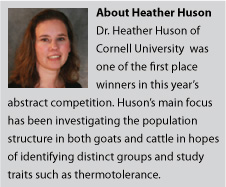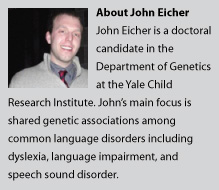Golden Helix is excited to host a webinar on Tuesday August 26th discussing the Genomic Prediction methods which were recently integrated into the SVS software. Genomic prediction uses several pieces of information when calculating its results. Genetic information is used to predict the phenotype or trait for the individuals. The phenotypic trait data can be provided for a subset or for all… Read more »
Over the last decade, DNA sequencing has made vast technological improvements. With the cost of sequencing decreasing significantly, sequencing technology has become a product for the masses. The sequencing technology and programs that were once used exclusively by major research institutions are now becoming available in many research facilities around the globe. These tools produce large amounts of data sets… Read more »
You probably haven’t spent much time thinking about how we represent genes in a genomic reference sequence context. And by genes, I really mean transcripts since genes are just a collection of transcripts that produce the same product. But in fact, there is more complexity here than you ever really wanted to know about. Andrew Jesaitis covered some of this… Read more »
For the SVS 8.2 release we decided to improve upon the existing ROH feature. The improvements include new parameters to define a run and a new clustering algorithm to aide in finding more stringent clusters of runs. The improvements were motivated by customer comments and a recent research paper by Zhang 2013, “cgaTOH: Extended Approach for Identifying Tracts of Homozygosity,”… Read more »
Earlier this year we completed the marriage of SVS and GenomeBrowse. When we released Version 8 of SVS we completed a major engineering task. A lot of things under the hood of both products had been changed to create a seamless experience for our users. The new and improved SVS platform is based on a technology stack that allows us… Read more »
“Who has ever had a bad experience with a VCF file?” I like to ask that question to the audience when I present data analysis workshops for Golden Helix. The question invariably draws laughter as many people raise their hands in the affirmative. It seems that just about everybody who has ever worked VCF files has encountered some sort of… Read more »
Drumroll, please! Voting has come to a close for the 2014 Golden Helix T-shirt contest, and there were some clear favorites among the finalists. We are very excited at the wealth of creativity that came forward with this contest and are happy to announce that our final decisions have been made.
Genetic improvement in livestock, particularly dairy cattle, has been a priority for both industry and researchers for nearly a century. While the animal itself is the foundation for improvement, our research and the implementation of improvement has progressed with developing technologies and priorities. In terms of genetics, we have evolved from basic measures of heritability to identifying specific mutations and… Read more »
Last month, June 2014, we announced a new method that Golden Helix developed–the soon to be available MM-KBAC. MM-KBAC, or Mixed Model Kernel Based Adaptive Clustering combines the KBAC method developed by Lui and Leal (2010) with a random effects matrix to adjust for relationships between samples. The KBAC algorithm takes a binary dependent variable and transformations are used to convert… Read more »
With the t-shirt submission deadline behind us, it’s time for the exciting part of the contest – picking the winners! We received a ton of fantastic designs and had a hard time narrowing them down. But, the Golden Helix team has picked seven designs that truly embody the Golden Helix spirit.
We released GenomeBrowse 2.0 earlier this year, allowing users to review all types of genomic data. Since then, it has received rave reviews from thousands of users around the world. Essentially, it’s the Google Earth app for genomic data. GenomeBrowse allows a user to sift through vast amounts of genomic data, and make it easy to focus on a single part… Read more »
It is with great excitement that we introduce our next webcast: Population Structure & Genetic Improvement in Livestock, presented by Dr. Heather J. Huson of Cornell University. Huson was one of the first place winners in this year’s research abstract competition. As part of the competition Huson has the opportunity to present her research in a webcast on Tuesday July… Read more »
I recently gave a webcast on GWAS in a model organism: Arabidopsis thaliana; a question was brought up about the differences between EMMA and EMMAX and why the results with each would differ.
Join us tomorrow, July 9th at 12PM EDT, for Ashley Hintz’s webcast on GWAS in a Model Organism: Arabidopsis Thaliana. Joining the Golden Helix team as a Field Application Scientist in April of 2014, Hintz is the perfect candidate to present on Arabidopsis Thaliana given her background in zoology and phylogenetics of planigales.
Up until a few weeks ago, I thought variant classification was basically a solved problem. I mean, how hard can it be? We look at variants all the time and say things like, “Well that one is probably not too detrimental since it’s a 3 base insertion, but this frameshift is worth looking into.” What we fail to recognize is… Read more »
We are incredibly excited to sponsor the 2014 Golden Helix Summer School (not directly affiliated with Golden Helix, Inc. (us)), hosted on the island of Aegina, Greece, from September 11th-15th, 2014. This year’s theme is “Pharmacogenomics and Genomic Medicine: Bridging research and the clinic” and will focus on disciplines within genomic medicine. The Golden Helix Summer School, conducted annually, is a… Read more »
We are excited to let you know about two new scripts to aid in Numeric Regression analysis. Don’t forget about the Technical Support Bulletins which keep you up-to-date on all the latest script news. You can stream this feed via an RSS reader, receive email updates, or see the latest on the SVS splash screen. Linear and Logistic Regression with… Read more »
When many people think of learning disabilities such as dyslexia and language impairment, they typically do not think of a biological or medical condition. Even more rarely do people think of these conditions as being the result of biological and genetic phenomena. However, that is exactly what I have thought of every day during my doctoral training in the Department… Read more »
For lead geneticist Dr. Matthew McClure, of the Irish Cattle Breeding Federation (ICBF), finding a software program that could handle massive amounts of data as well as more than the standard twenty-three pairs of chromosomes found in humans was a challenge. McClure says, “Agriculture often feels like the black sheep of the genomics industry. The majority of current genetic analysis… Read more »
Philadelphia. The City of Brotherly love, home of the Philadelphia cheesesteak, and home to the Children’s Hospital of Philadelphia, who took the No. 1 spot in this year’s U.S. News & World Report’s Best Children’s Hospitals Honor Roll. We are honored (and excited!) to sponsor this year’s Mid-Atlantic Epidemiology and Statistics (MAGES) Conference at the University of Pennsylvania. MAGES will… Read more »



